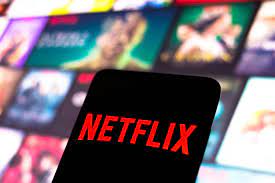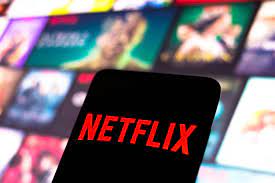
Netflix Inc said that inflation, the Ukraine conflict, and fierce competition contributed to a loss of subscribers for the first time in more than a decade, and that it expects even more losses in the future, signalling an abrupt turn in fortune for a streaming company that thrived during the pandemic.
According to the corporation, it lost 200,000 subscribers in the first quarter, falling far short of its target of 2.5 million new subscribers. After the invasion of Ukraine, the suspension of service in Russia had a toll, with 700,000 members losing their jobs.
After the bell on Tuesday, Wall Street pushed Netflix's stock down 26%, wiping out almost $40 billion in market value. Since announcing dismal subscriber growth in January, the company has lost over half of its market capitalization.
Netflix is considering launching a lower-cost version of the service with advertising due to slow subscriber growth, noting the success of comparable services from rivals HBO Max and Disney+.
"Those who have followed Netflix know that I've been against the complexity of advertising, and a big fan of the simplicity of subscription," said Netflix CEO Reed Hastings. "But, as much as I'm a fan of that, I'm a bigger fan of consumer choice."
Despite the return of such highly awaited programmes as "Stranger Things" and "Ozark," as well as the release of the film "The Grey Man," starring Chris Evans and Ryan Gosling, Netflix forecasted a 2 million membership loss in the spring quarter. According to Refinitiv statistics, Wall Street expected 227 million in the second quarter.
Roku, Walt Disney, and Warner Bros Discovery were all hit by the downdraft, with Roku plunging nearly 6 per cent, Walt Disney falling 5 per cent, and Warner Bros Discovery down 3.5 per cent.
Hastings told investors that the epidemic had "generated a lot of noise," making it harder to analyse the company's subscription business's ups and downs during the last two years. It now appears that a combination of rivalry and the number of accounts exchanging passwords is to blame, making it more difficult to expand.
"When we were growing fast, it wasn't a high priority to work on," Hastings said of account-sharing in remarks during Netflix's investor video. "And now we're working super hard on it."
Netflix's first-quarter revenue increased 10 per cent to $7.87 billion, slightly less than Wall Street expectations. It posted $3.53 in net earnings per share, topping the $2.89 forecast on Wall Street.
While the firm is still optimistic about the future of streaming, it attributes its slowing growth to a variety of factors, including the rate at which consumers embrace on-demand services, a rising number of competitors, and a poor economy.
Account-sharing is a long-standing practise, but Netflix is looking into methods to monetize the 100 million homes that utilise shared accounts to watch Netflix, including 30 million in the United States and Canada.
As a result of this combination of events, Netflix reported losing customers for the first time since October 2011, surprising Wall Street.
"They suffered from a combination of approaching saturation, inflation, higher pricing, the war in Ukraine and competition," said Wedbush analyst Michael Pachter. "I don’t think any of us expected that all to happen at once."
In the face of fierce competition from established rivals like Amazon.com, traditional media corporations like Walt Disney and the newly created Warner Bros Discovery, and cash-flush newcomers like Apple Inc., the world's biggest streaming service was expected to post declining growth.
According to analyst Ampere Analysis, streaming services spent $50 billion on new material last year in an attempt to attract or keep consumers. That's a 50 percent increase from 2019, when several of the newer streaming services debuted, indicating the "streaming wars" are quickly escalating.
According to Nielsen, a measure of member satisfaction and retention, Netflix's proportion of TV viewing in the United States has remained stable despite increased competition.
Netflix is increasingly focusing on other parts of the world and investing in local-language programming as growth in mature markets such as the United States slows.
"While hundreds of millions of homes pay for Netflix, well over half of the world's broadband homes don't yet -- representing huge future growth potential," the company said in a statement.
The shaky global economy, according to Benchmark analyst Matthew Harrigan, "is apt to emerge as an albatross" for member growth and Netflix's ability to keep boosting rates as competition heats up.
Streaming services aren't the only kind of entertainment competing for the attention of consumers. According to Deloitte's newest Digital Media Trends survey, Generation Z, or consumers aged 14 to 25, spend more time playing games at home than viewing movies or television programmes, or even listening to music.
The majority of Gen Z and Millennial respondents claimed they spend more time viewing user-created videos on TikTok and YouTube than watching movies or episodes on a streaming service.
Netflix's stock, according to one market analyst, has profited from assumptions of everlasting growth.
"Today's report shows that there is a limit to that long-term bullish thesis," said David Keller, chief market strategist at StockCharts.com.
(Source:www.flipboard.com)
According to the corporation, it lost 200,000 subscribers in the first quarter, falling far short of its target of 2.5 million new subscribers. After the invasion of Ukraine, the suspension of service in Russia had a toll, with 700,000 members losing their jobs.
After the bell on Tuesday, Wall Street pushed Netflix's stock down 26%, wiping out almost $40 billion in market value. Since announcing dismal subscriber growth in January, the company has lost over half of its market capitalization.
Netflix is considering launching a lower-cost version of the service with advertising due to slow subscriber growth, noting the success of comparable services from rivals HBO Max and Disney+.
"Those who have followed Netflix know that I've been against the complexity of advertising, and a big fan of the simplicity of subscription," said Netflix CEO Reed Hastings. "But, as much as I'm a fan of that, I'm a bigger fan of consumer choice."
Despite the return of such highly awaited programmes as "Stranger Things" and "Ozark," as well as the release of the film "The Grey Man," starring Chris Evans and Ryan Gosling, Netflix forecasted a 2 million membership loss in the spring quarter. According to Refinitiv statistics, Wall Street expected 227 million in the second quarter.
Roku, Walt Disney, and Warner Bros Discovery were all hit by the downdraft, with Roku plunging nearly 6 per cent, Walt Disney falling 5 per cent, and Warner Bros Discovery down 3.5 per cent.
Hastings told investors that the epidemic had "generated a lot of noise," making it harder to analyse the company's subscription business's ups and downs during the last two years. It now appears that a combination of rivalry and the number of accounts exchanging passwords is to blame, making it more difficult to expand.
"When we were growing fast, it wasn't a high priority to work on," Hastings said of account-sharing in remarks during Netflix's investor video. "And now we're working super hard on it."
Netflix's first-quarter revenue increased 10 per cent to $7.87 billion, slightly less than Wall Street expectations. It posted $3.53 in net earnings per share, topping the $2.89 forecast on Wall Street.
While the firm is still optimistic about the future of streaming, it attributes its slowing growth to a variety of factors, including the rate at which consumers embrace on-demand services, a rising number of competitors, and a poor economy.
Account-sharing is a long-standing practise, but Netflix is looking into methods to monetize the 100 million homes that utilise shared accounts to watch Netflix, including 30 million in the United States and Canada.
As a result of this combination of events, Netflix reported losing customers for the first time since October 2011, surprising Wall Street.
"They suffered from a combination of approaching saturation, inflation, higher pricing, the war in Ukraine and competition," said Wedbush analyst Michael Pachter. "I don’t think any of us expected that all to happen at once."
In the face of fierce competition from established rivals like Amazon.com, traditional media corporations like Walt Disney and the newly created Warner Bros Discovery, and cash-flush newcomers like Apple Inc., the world's biggest streaming service was expected to post declining growth.
According to analyst Ampere Analysis, streaming services spent $50 billion on new material last year in an attempt to attract or keep consumers. That's a 50 percent increase from 2019, when several of the newer streaming services debuted, indicating the "streaming wars" are quickly escalating.
According to Nielsen, a measure of member satisfaction and retention, Netflix's proportion of TV viewing in the United States has remained stable despite increased competition.
Netflix is increasingly focusing on other parts of the world and investing in local-language programming as growth in mature markets such as the United States slows.
"While hundreds of millions of homes pay for Netflix, well over half of the world's broadband homes don't yet -- representing huge future growth potential," the company said in a statement.
The shaky global economy, according to Benchmark analyst Matthew Harrigan, "is apt to emerge as an albatross" for member growth and Netflix's ability to keep boosting rates as competition heats up.
Streaming services aren't the only kind of entertainment competing for the attention of consumers. According to Deloitte's newest Digital Media Trends survey, Generation Z, or consumers aged 14 to 25, spend more time playing games at home than viewing movies or television programmes, or even listening to music.
The majority of Gen Z and Millennial respondents claimed they spend more time viewing user-created videos on TikTok and YouTube than watching movies or episodes on a streaming service.
Netflix's stock, according to one market analyst, has profited from assumptions of everlasting growth.
"Today's report shows that there is a limit to that long-term bullish thesis," said David Keller, chief market strategist at StockCharts.com.
(Source:www.flipboard.com)














